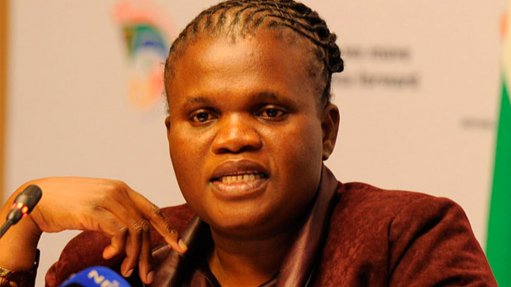
Communications Minister Faith Muthambi
The Department of Communications (DoC) has lent its support to community broadcasters, but warned that funds were limited in a stalled economic climate and that other sources of funding should be sought.
Communications Minister Faith Muthambi on Friday told stakeholders at a community broadcasters engagement workshop, in Boksburg, that the DoC remained concerned about the governance of the sector and its funding and would become more strict with the allocations it made.
“The mentality of entitlement and not having consequence management must end. Stations cannot continue demanding money from government where they themselves have been at fault and keep on changing board members so they can have access to government funding,” she said.
Government’s funding would be more selective, with community broadcasters having the spotlight thrust on them in terms of licence compliance, the target audience and community-based content and programming.
“Radio stations are going to play 90% local music . . . My view is that the community broadcasting sector can go up to 95%,” Muthambi said.
Government was facilitating the development of digital content hubs and the Digital Radio Policy to promote content development across digital platforms.
The sustainability and viability of the nonprofit entities would also come into play.
“We will only fund a fair and balanced community broadcasting sector that can serve the entire community and operate within a clearly defined mandate which focuses on community service broadcasting,” she explained.
“... No more double-dipping or lying to political representatives because you have abused your funding or resources provided to you by the DoC, the Media Development and Diversity Agency (MDDA) or Government Communication and Information System.
“Once we fund you . . . we cannot overlook others and prioritise you because you have changed your boards or management; you will have to ensure that you raise funding from other sources,” she warned participants at the meeting.
However, Muthambi assured that government remained committed to nourishing the community broadcasting sector and planned to revamp and invest in community media to ensure the broadcasters preserved, produced and supplied relevant local and locally-originated programming on relevant issues, such as welfare benefits, employment rights and promoting more voices and viewpoints in the media.
“Working together with MDDA, the Independent Communication Authority of South Africa and Sentech, we are now coordinating different support programmes for the sector across government to ensure that there is a holistic approach with no duplication and that resources are used effectively,” Muthambi pointed out.
Further, the department would embark on a nationwide roadshow to unpack the draft positions related to the Community Radio and Television Support Strategy.
“We would like to finalise this so that we submit it to Cabinet for it to become a national support strategy of government once we have reconfirmed with you our preliminary views.”
Community broadcasters would also need to step up to the plate and “adapt to change”.
Muthambi said that, to keep up with the rapid pace of digital change, community broadcasters needed to develop new business models and fundamentally “rethink” the role of the community broadcasting sector.
“. . . Focus on services that are needed in society which would not be provided otherwise, concentrate on community service broadcasting which meets the programming, cultural and broadcasting needs that cannot be provided in a commercial and public space.
“It is the role of a strong community media sector to strengthen local communities by promoting human rights education [and] where democratic engagement and civic participation are to be nurtured,” she concluded.